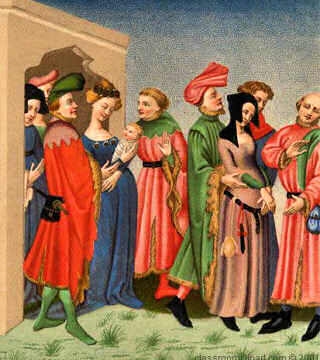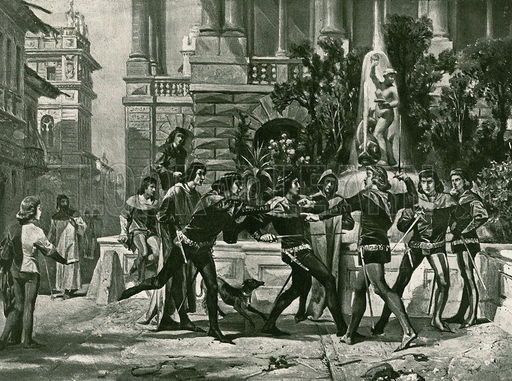Of Capulets and Capitalism, part 2
 A guest post by Nate Chen, who portrays Lord Capulet, Juliet’s father, in our production.
A guest post by Nate Chen, who portrays Lord Capulet, Juliet’s father, in our production.
———————-
When I sat down to consider how to best play the part of THE Capulet in Romeo and Juliet, I wasn’t thinking of commerce or mercenaries. But
after reading the script, one thing that bothered me was that I couldn’t put my finger on what Capulet’s place in Verona society was supposed to be. He’s important, of course, and he wants everyone to know it. But why is he important?
It’s tempting to say that he’s a noble, or that Shakespeare didn’t really care why he was important. But Italy was the place for art and culture of that time–well-known to all, surely. I started to wonder if there were simply factors at work that Shakespeare understood in his head but didn’t feel obligated to explain in the script. For example, what if Capulet was not a noble, but rather a wealthy merchant?

It’s clear from the way he acts that Capulet is doing his best to keep the family’s reputation afloat in Verona. Part of this is no doubt due to the long-running blood feud with the Montagues, but it may also be because wealth is a tenuous claim to fame, quick to disappear if not managed. The prospect of marrying Juliet to Paris brings some of the stability of a noble title, no doubt the reason Capulet entertains the notion. But at the same time, marriage was very much a political tool of the time and there was no telling when a better match for Juliet might come along.
It would make sense for Capulet to secure whatever advantage he could, of course, but he only had one daughter. That made Juliet his only heir and, while hardly what we’d consider a loving father today, Capulet does show signs of wanting what’s best for his daughter… where “what’s best” is defined as everything he can get his hands on. So it may not be surprising he holds back, especially when the family has another claim to fame.

After all, Mercutio mentions that Tybalt, Capulet’s nephew, is the best fighter in Verona. With Tybalt’s reputation, it sounds as if he’s killed people–but managed to do it in a way that hasn’t gotten him exiled or executed yet. That makes it logical to assume that Tybalt was a condottiere working on behalf of the prince. That position would explain:
- how he could get away with being so antisocial in spite of being a member of a wealthy and upstanding family;
- how he could gain such a deadly reputation without suffering much consequence; and
- why his uncle would be confident holding the County Paris at arm’s length when he came a-courting.
A condottiere in the family is a significant claim to fame, and, although even more tenuous than wealth, probably enough that Capulet could feel secure of his position – as long as Tybalt was alive.
 In the end, the script of Romeo and Juliet doesn’t give much support to this premise. Shakespeare wasn’t really interested in delving into these issues and we have no way of knowing how much he knew about them in the first place. But knowing about them does help us to get a picture of the vibrant, enchanting, crass and deadly backdrop against which one of Shakespeare’s most famous plays took place.
In the end, the script of Romeo and Juliet doesn’t give much support to this premise. Shakespeare wasn’t really interested in delving into these issues and we have no way of knowing how much he knew about them in the first place. But knowing about them does help us to get a picture of the vibrant, enchanting, crass and deadly backdrop against which one of Shakespeare’s most famous plays took place.
These characters were not just masks upon a stage, they were intended to be real people in a real city. They could have been lords and ladies of the court in Verona. Or they could have been merchants struggling to make and keep a place in a rapidly changing social landscape.
